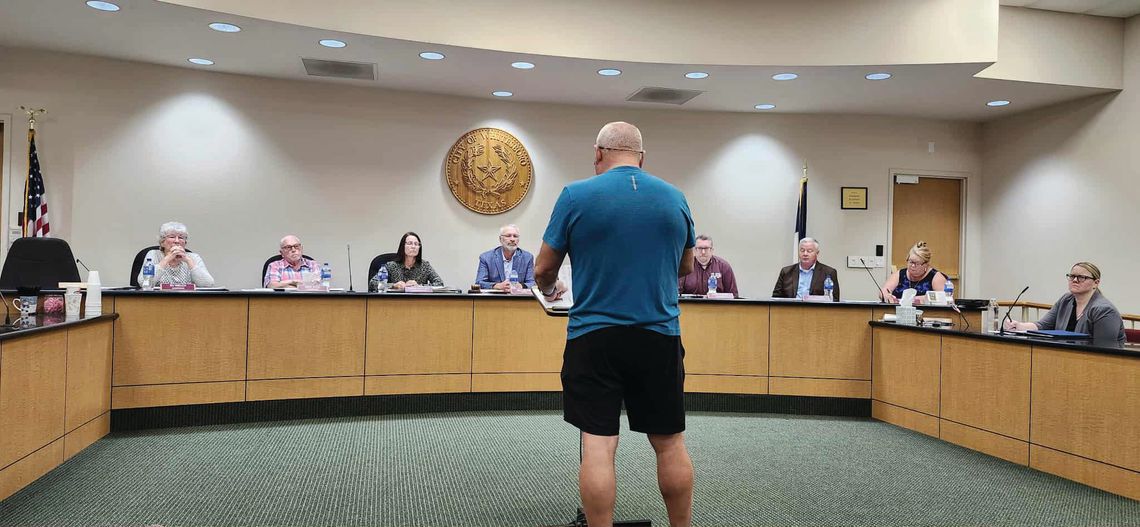At the conclusion of Monday night’s public hearing, the Whitesboro City Council unanimously adopted its proposed tax rate of $0.585800 per $100 valuation. This is an increase over the city’s current rate of $0.387645 per $100 valuation.
Monday’s special-called meeting was the city’s second public hearing regarding this proposed tax rate. The first hearing (held on Sept. 9) raised questions regarding whether the city was in compliance with a state law requiring audits to be completed within 180 days after the last day of the municipality’s fiscal year. If not, a recently-passed State Bill 1851 requires cities to choose a no-new-revenue tax rate.
At that time, the city chose to table the discussion to allow their attorney to seek clarification. Now, City Administrator Phil Harris says the city is in compliance as of the passing of the bill, which went into effect Sept. 1. State Representative Shelley Luther disagrees and has filed a dispute with Attorney General (AG) Ken Paxton.
It was standing room only Monday night as citizens gathered at City Hall to share concerns and see what the council would decide. While several people spoke at the first hearing (lasting about an hour), only three people addressed the council during Monday’s hearing (which lasted only 16 minutes).
Resident Jon Estes voiced his concerns regarding truth-in-taxation requirements, claiming the city had not published tax information at Texas.gov/PropertyTaxes as allegedly required by law. He also said that the city is over the 3.7% increase cap that the state allows without calling for a vote from its citizens.
In actuality, when a city considers a property tax, it has two options: It can choose a no-new-revenue tax rate, which allows the city to collect the same amount of revenue as the previous year, despite changes in property values. Or it can propose to change the rate.
If it opts to raise the rate, a city can only increase the amount to a certain threshold (the voter-approved rate). If the increase is higher than this amount, the city must hold an election to seek voter approval.
However, small cities can opt for the de minimis rate – the sum of the no-new-revenue maintenance and operations rate, debt rate and a rate that would raise $500,000 more in revenue than the no-new-revenue rate. If a city adopts a rate at or below this number, it doesn’t have to hold a tax rate election.
According to the public notice published by the city, Whitesboro’s de minimis rate is $0.688399 per $100 valuation. Since the proposed rate of $0.585800 is lower than that rate, no voter approval is required.
The second speaker of the night was Luther, who wanted to provide more clarification on frozen taxes for citizens aged 65 and older.
At Sunday night’s budget hearing, Luther had explained that frozen taxes for 65 and older only applied to school taxes. However, she had since learned that Whitesboro adopted an ordinance in 2004 that froze property taxes for this age group as well. She issued a public apology for not knowing about the ordinance but maintained her disagreement with the proposed tax increase.
“I don’t think that all of the things that the City Administrator is suggesting (in the budget) are needed,” she said.
She also shared her concerns about the compliance issues that have been raised at previous meetings.
“I’m still in communication with the AG with this. I talked to him personally on the phone a couple of days ago. He’s not happy about it. His team is working out how they want to take care of this. We don’t have it in writing yet, but I assume that it’s going to cost you more money if you decide to raise the property taxes and then he decides in his office that you guys are not in compliance with the current law, and then you have to spend all this money to go back and fix what you’re doing,” Luther said. “My suggestion would be to not raise the tax revenue at all. Make sure next year that you are completely compliant with what you’re doing.”
Citizen Stephan Gardner also approached the podium with a box of tea bags, reminding the Council that in 1765, the Stamp Act (which involved a 3% tax increase) eventually led to the Boston Tea Party and “caused us to start a new country.”
He asked the council to listen to the constituents that they represent.
At the conclusion of the hearing, Harris provided alternative budgets to the council for review but recommended the $0.585800 tax rate, and the budget was unanimously approved.
Next, the council took a roll call vote for the adoption of the proposed property tax increase. The motion passed unanimously.
With the remainder of the meeting, the council also approved:
- The closure of the 100 block of West Main Street for Peanut Festival (an agreement with TxDOT).
- To prohibit any downtown festivals or events to take place anytime during Oct. 1 through the third Saturday of October so as not to take away from Peanut Festival.
- Reappointment of Chris Dobbs, Matthew Pike and Keith Muldrew to the Whitesboro Economic Board Type B.
The council also rescheduled its next two meetings. The Oct. 7 meeting will now be held on Oct. 21 at First State Bank in Whitesboro, and the Nov. 11 meeting will now take place on Nov. 13 at City Hall.

